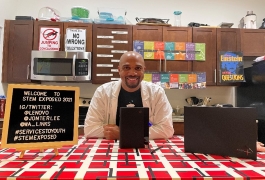How to Score a Chemistry Job in Climate Science
Your days as an undergraduate student are occurring at a turning point in human history. Faced with the looming burden of climate change, the world needs science experts more than ever—more specifically, the world needs chemistry experts more than ever.
Fortunately, it seems like this generation is up to the challenge. Tiffany Blessing, a college counselor specializing in STEM education at IvyWise, has noticed a trend among undergrads and high school students in the past two years. “They're thinking about: ‘How do we solve major problems that are facing our environment and our community?’” Blessing says. “They want to impact change.”
“Increasingly, I feel like students want to see something that's societally relevant,” adds Allison Steiner, a professor from the University of Michigan’s Climate and Space Sciences and Engineering department. “Not just studying science for the sake of studying science, they want to do useful science.”
But what exactly can you do with a chemistry degree if you’re interested in the science of climate change? And what do we mean by experts?
It’s hard to figure out what to do after you graduate. It may sometimes feel impossible to even decide what you want, much less how to actually get that dream job. And is graduate school the first step? (Spoiler alert: not necessarily.)
As it turns out, there are many ways to apply the skills and knowledge you’re getting in your chemical sciences major toward a job related to climate. And that’s great news. According to a report by the Pew Research Center, 70% of people in the US “find meaning” to life in their career; 34% said their careers provide a great deal of meaning.
So it’s no wonder you want to combine your training and your passion.
We are here to help. Here is a rundown of the types of jobs you can get—and how to prepare yourself for them.
Calculations and Consultations
Immediately after getting her bachelor’s degree in chemical engineering, Steiner started a job at an environmental consulting firm. She was already interested in environmental issues, and that job let her use her skills in data analysis and chemistry. She would visit her clients’ sites, learn about the sources of their emissions, and help fill out regulatory permits.
This type of job sits at the interface of private industry and public policy. Her work helped ensure that the local, state, or federal government could account for potentially dangerous emissions.
Steiner worked with industrial plants, agricultural emissions, and in other areas. “Some of it might be more transportation related—looking at mobile emissions,” she says.
She would ask a lot of questions: “How much coolant are people using within different processes around the facility? How much do they buy per year? What are they doing with it? Where does it go?” Steiner recalls asking. “Then you go back and calculate emissions, and then you prepare a report for them.”
One site she visited needed a better grasp of the volatile organic compound (VOC) emissions from the paint in their printing presses. “We did some work at landfills, groundwater, and there was kind of this growing air component to it,” she says. This exposure to the chemistry of air quality issues intrigued her.
Steiner notes that if you’re interested in climate science as a chemist, working for a consulting firm isn’t your only option. “A lot of nonprofits are doing climate analysis work,” she says. Nonprofits like the Environmental Defense Fund hire people with bachelor’s and master’s degrees. Some companies or corporations hire their own environmental and regulatory teams out of college as well. “I think a lot of the quantitative stuff that you would learn with a chemistry degree would make [climate analysis] attractive.”
To really stand out in this realm of climate science work, it might help to get acquainted with earth science, atmospheric science, or meteorology. Consider rounding out your chemistry credits with electives in earth science or internships in this field. That could show employers you’re interested and even teach you the language and tools you’d need on the job.
You could also prepare for entry-level jobs in climate science by beefing up your data analysis skills. On the job, you may have to work with analyzing satellite images or geospatial data. Try learning a programming language such as Python. “In atmospheric sciences, Python is kind of emerging as one of the standard tools of analysis,” says Steiner.
After a few years of consulting, Steiner followed her growing passion for air quality analysis into a PhD program at Georgia Institute of Technology to study atmospheric chemistry. “It's easier to move around than you think,” she says. “Getting your first job is actually the hardest. Because once you have some work experience, it makes it easier to move.”
Representing Chemistry
Marcius Extavour knows very well that your current job—especially your first job—doesn’t define your career. Extavour is the vice president of energy and climate at the nonprofit XPRIZE, where he runs competitions for companies and researchers designing tech that benefits humanity. But before joining XPRIZE, Extavour got a PhD in physics at the University of Toronto and tried out many jobs in the world of climate change.
“I took a job in a power company,” Extavour says. That exposed him to the business side of electrical utilities—an important part of the climate puzzle because economics and profitability so often determine what technologies survive the jump from lab to real world. After that, he took a science policy fellowship in Washington DC. He was a junior science adviser on Capitol Hill, working on energy and climate issues. He remembers being struck by how DC was full of scientists, researchers, and people trained in science who use their skills and background in different ways.
“That was really eye-opening for me,” says Extavour. “It opened my eyes to the fact that you can be a scientist and not necessarily just work with a pipette and beaker all day.”
That science and technology fellowship was set up by the American Association for the Advancement of Science, or AAAS. It’s a prestigious and popular fellowship where people with degrees in science get jobs for one or two years inside the government. Many chemistry students who are passionate about climate science want to shape policy because that is an important step toward global action.
“I was really curious—how do politicians actually interact with science?” says Matthew Diasio, a policy adviser who specialized in materials science in grad school at the University of Virginia, then got a AAAS fellowship sponsored by ACS. “Whether that's for research, like NSF and NIH, or the agencies that have more of a clear mission like NASA or DOE—what do they think is important?” (Diasio also completed the AAAS Mass Media Science & Engineering Fellowship, which trains scientists to be science journalists.)
As a policy fellow, Diasio worked with Senator Tina Smith of Minnesota. The work was often fast-paced: “Reacting to events going on every day, whether that was in the news or just in Congress,” he says. A typical day included calling experts and researching topics to make sure the policymakers were well-informed about which policies to make. “The recommendation can be from ‘Join this bill,’ or ‘Join this letter,’ to ‘You should write a bill.’” Diasio now advises on science and innovation policy issues at the British embassy.
Science policy is a big change of pace from undergraduate chemistry, but a lot of the skills you are learning now are transferable. “If you're trained in science or engineering, you have a good analytic mind,” Diasio says.
Finding Your Climate Niche
Extavour says getting that science policy job gave him a lot of confidence in the job prospects with a degree in science. “There’s all kinds of interesting, fun topics out there that aren't necessarily in the textbooks that rely on our knowledge that we have as science-trained people,” he says. “It just felt like the world really opened up.”
After his fellowship, Extavour started consulting for the Canadian government on energy issues. Then he worked for the University of Toronto, raising money for big engineering projects, before joining XPRIZE. In his career and role at XPRIZE, he gets exposed to all sorts of technologies and applications for chemistry in the world of climate.
There are plenty of unique industries and jobs for bachelor’s-level chemists that may be more interesting. “I think the whole ‘clean fuels’ area is something that's great for people with a chemical background,” says Extavour. “Whether it's biofuels, or hydrogen, or hydrogen fuel cells, alternative forms of diesel, jet fuel, ammonia. The liquid-energy-carriers world—that's a big, big area of change and opportunity.”
And your day-to-day in these jobs would vary a lot. “You can have anything from a corporate type of job, to a consulting type of job, to a technical laboratory testing type of job,” says Extavour. You can even work in the policy or the legal side of companies or organizations: “Like standards and laws and community engagement around low-polluting jet fuels, or things like that.”
The passion you have now and the skills you work on can set you apart. Before his power company job, Extavour had no relevant experience in energy. “Look, nothing in any of my papers that I've written, my actual science, is going to make you think that I can do this job,” he recalls saying. “But you know what I can do? I can write software. And I'm really good at math.”
That moment cemented Extavour’s turn away from academic research toward his passion for energy and climate. “And I basically have been figuring out how to do that outside of academia ever since,” he says.
To Grad School or Not
Extavour remembers feeling pressure in college to go to graduate school. The academic culture seemed to suggest that getting a job with a bachelor’s was like “giving up,” because you can’t hack it in science. “If you’re good, you go to graduate school because that’s where the really smart people go,” Extavour recalls feeling. “In retrospect, it turns out that’s a myth.”
Extavour’s graduate degree was required for the science policy fellowship that changed his career trajectory. “In the world of science, having a PhD gets me all kinds of opportunities that not having a PhD wouldn't,” he says, due to the knowledge and reputation an advanced degree provides. That said, he only recommends doctoral programs for people with a passion for research. Graduate school isn’t essential for every scientific job. “You can do anything you want,” he says. “I think that’s the big, big secret.”
“If you know you're interested in policy from the beginning,” says Diasio, you don’t have to start a PhD and take the same path he and Extavour did. “Look for government postings, or other NGOs, or think tanks that are interested in taking people.”
Blessing, the counselor, gets students to think about the future and work backwards when she advises them on their next steps. “We kind of reverse engineer it,” she says. Consider your passions and what sort of job you’d like to do. Then, work out what’s required to get there.
If you want to be a climate analyst or environmental consultant, you may not need a graduate degree. If you want a job working on the tech or business of combating climate change, rather than running lab experiments, you don’t necessarily need a PhD in chemistry either. If you want to conduct basic research of atmospheric chemistry or climate dynamics, getting a PhD may be your best bet.
You don’t have to get your PhD in the same major as your undergraduate major though. A chemistry degree is versatile enough to land you in a grad program across all sciences.
Plus, new programs are breaking the mold of classical science disciplines, and those may also be a good fit. “There are a number of grad programs, and master programs that are appearing, that really speak specifically to climate change,” says Blessing. She notes that Columbia University recently announced an entire school dedicated to climate science, called the Columbia Climate School. “It’s like, wow, how specific can you get?”
And remember that it’s always OK to change your mind, your job, and your field. Steiner switched from consultant to professor by getting a PhD. That was the right decision for her, but she acknowledges all aspirations in her students.
“When I talk with my undergrads a lot of times, you know, they don't really know exactly what they want to do,” says Steiner. “You try it. And if you don't like it, then you try something else.”





